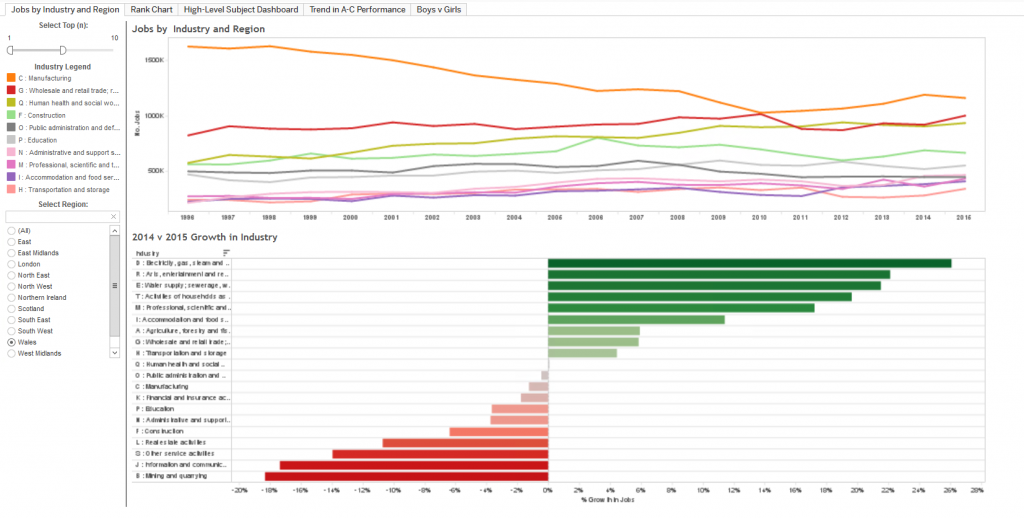Further Education Colleges are adept at dealing with change and challenge. They have to be. Identifying, evaluating and capitalising on opportunities which arise in the rapidly changing environment we work in is a core skill of all successful college leaders.
Recent conversations with college principals have shown that meeting local employers’ needs; improving student experience and outcomes; helping to bridge the skills gap; and serving the local population, particularly school leavers, are all high on their list of priorities.
Alongside the economic, political and regulatory challenges faced by colleges, there have been other significant technological and data developments which can help us to address them. For example, high quality, detailed data sources (both open and securely held) are now more accessible than ever before. The tools to process, link and visualise these data sets are becoming more sophisticated and easier to use all the time.
We know that using accurate local area data to inform strategic planning and decision making is crucial to success. Presenting the information in a visual and interactive way helps leaders to communicate their vision and ideas to their funders, staff teams, students and the wider community. However, what we have found is that there is a wide variation in the effectiveness of the way in which colleges make use of the data available to them. We also found significant duplication of similar core processes across colleges.
How can the FE and Skills community benefit from the availability of new data sources and state-of-the-art data visualisation technologies?
Jisc’s well-established Analytics Lab environment provides a secure technical, legal and project management framework to enable the creation of new, experimental data dashboards. As part of the Jisc HESA Business Intelligence project, participants use a mix of open and secure data from both new and established sources, to create visualisations and dashboards which address key business questions.
In January, we extended this project to include the FE and Skill sector, working with two groups of colleges – one from South East Wales and the other from the Greater Manchester City Region. This pilot project used our unique specialist Analytics Lab development environment, making a few adjustments to meet specific FE needs, and was underpinned by our knowledge of the Jisc Learning Analytics data definitions and architecture. More details about the two pilot projects will appear in future blog posts.
College Analytics Lab – An experimentation and data dashboard development environment
The College Analytics Lab can be thought of as having three components:
- Technical infrastructure
A secure, remote desktop environment which contains state-of-the art data visualisation tools including Tableau and Alteryx. - Data and legal
The secure environment is used to house a wealth of data collected from a variety of sources, cleaned and in a format that is ready to use. Carefully agreed and signed legal agreements enable colleges to use sensitive data securely, as needed. - People
The most important element. Teams are made up of sector experts (who understand the important business questions facing them and what data will help them to find the answers); consultants who are able to transform and link data to create powerful interactive visualisations and dashboards; and Jisc staff who provide agile project management.
Our proven Analytics Lab agile process
Teams of sector experts work together on a focused 3-month project. At the start of the project they work together to identify and prioritise their most pressing business questions. They then consider which data sources would help them address these. Typically, these are a mix of internal, external, public, private, existing and new data sources.
The next step is to work with specialist data analysts and a Jisc project manager to explore identified data sources which, when combined, can help to answer their business questions.
It is a “lab” process, so is experimental by definition. It may or may not lead to the creation of dashboards which are generically useful to the sector, but they will certainly be useful for the participants.
Data sets from participating FE Colleges are analysed alongside other data from a variety of other external sources to produce visualisations and dashboards which can be used by a wide range of college staff enabling data-informed planning, benchmarking and strategic decision making.
Potential for the future
A few years ago, interrogating data was an expensive, specialist skill limited to a few within a typical FE college. Static reports would have been used by senior managers at specific times during the planning and evaluation cycle.
We hope the Analytics Lab environment will help open up the field of data science and bring it within the reach of all who have an interest in the college. In addition to the senior management teams, this could include subject / curriculum leads, support staff, Local Enterprise Partnerships, students, parents, governors and the wider community.
We have the facility to bring new open data sources (such as local transport routes) into the environment and build up a comprehensive catalogue to improve the use of data in the sector as a whole. Understanding underlying data trends and using the information for planning has the potential to improve the data literacy of all involved.
The Jisc Business Intelligence projects have enabled a wide range of HE professionals to engage critically with data in powerful ways to address key business questions facing them. I believe the same can be achieved in the FE and Skills sector, where this model will enable many more people to use data to inform strategic decision making.


